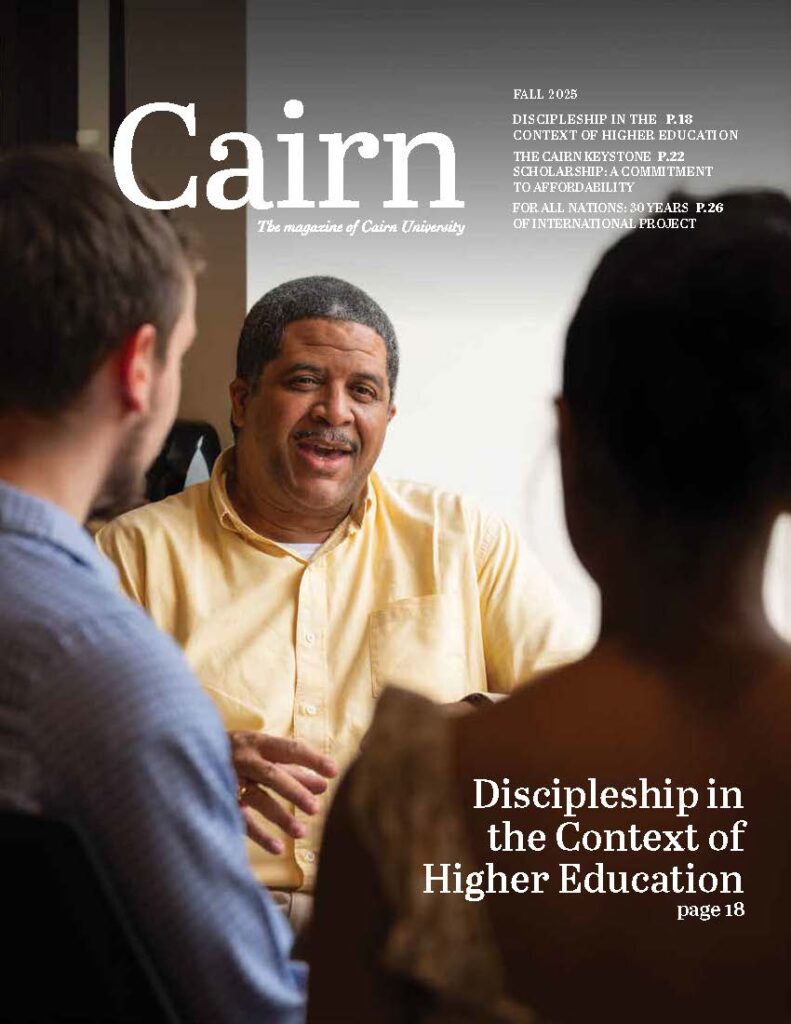The Lord blessed me to marry a woman who is the tenth child of a German Mennonite family. Her dad is with the Lord, but some of his sayings live on in my head. “Throw the horse over the fence some hay” always makes me chuckle. It makes perfect sense in German, but the English translation takes some thought. Another proverb embedded in my mind is more to the point of this article. In his eighties, he jested, “Too soon old; too late shmart.” I can see the twinkle in his eye beneath massively bushy eyebrows.
That proverb is true of many things. We learn life lessons over time. We know at age forty what we could not know at sixteen. Now that I’ve reached the “older” stage (according to my kids), arthritis, kidney stones, cataracts, Medicare, and other mysterious ailments are part of my vocabulary. This stage of life is unfamiliar territory, and I continue to learn. What is true of life in general is also true of life in the Spirit.
Take for example these words from Galatians: “But I say, walk by the Spirit, and you will not gratify the desires of the flesh” (Gal. 5:16). The verse is simple enough to understand but may take a lifetime to master.
The letter written to the Galatians was perhaps the earliest by Paul. Some scholars date it as early as 48 AD.1 It was written as the gospel was advancing beyond Jerusalem to the “end of the earth.”2 This was a time of transition from primary ministry to Jewish people to primary ministry to non-Jewish people (cf. Acts 10–11, 15). The church hotly debated adherence to the Mosaic law versus freedom from the law. A strong Jewish contingent argued that, in addition to faith in Christ, one must observe the law.
This “gospel plus something else” formula prompted Paul to write strong words:
“I am astonished that you are so quickly deserting him who called you in the grace of Christ and are turning to a different gospel— not that there is another one, but there are some who trouble you and want to distort the gospel of Christ. But even if we or an angel from heaven should preach to you a gospel contrary to the one we preached to you, let him be accursed. As we have said before, so now I say again: If anyone is preaching to you a gospel contrary to the one you received, let him be accursed” (Gal. 1:6–9).
“Let him be accursed!” Anathema, accursed, something devoted to destruction. This is strong language directed against grave error, the equivalent of “let him go to hell.”
More strong words and vital questions follow up in chapter 3:
“O foolish Galatians! Who has bewitched you? It was before your eyes that Jesus Christ was publicly portrayed as crucified. Let me ask you only this: Did you receive the Spirit by works of the law or by hearing with faith? Are you so foolish? Having begun by the Spirit, are you now being perfected by the flesh?” (Gal. 3:1–3).
Though Paul’s words are direct, they come from a heart of love. He refers to the Galatians as brothers nine times in the letter.3 But, when they act foolishly or “without understanding,”4 he appropriately corrects their error. “Did you receive the Spirit by works of the law or by hearing with faith? . . . Having begun by the Spirit, are you now being perfected by the flesh?” (vv 2–3). The implied answer, expanded in chapters 3–4, is that works of the law are powerless to overcome the flesh.
In chapter 5, the focus shifts to the work of the Holy Spirit. Believers in Christ are not set free from the law so they can become lawless or pursue the desires of the flesh. “Flesh” certainly can include physical things, as seen in verses 18–21, but generally refers to a way of thinking and living detached from God. Professor Scot McKnight rightly says, “to live ‘in the flesh’ is fundamentally living outside the realm of the Spirit of God. . . ‘flesh’ is unspiritual life.”5 In context, the passage likely refers to the “fleshly appeals of the Judaizers, their own libertine tendencies, or the debilitating disputes within their churches.”6
Charles Spurgeon metaphorically captured the problem of the flesh:
“The worst enemy we have is the flesh. . . . All the fire that the devil can bring from hell could do us little harm if we did not have so much fuel in our nature. It is the powder in the magazine of the old man that is our perpetual danger. When we are guarding against foes without, we must not forget to be continually on our watchtower against the foe of foes within.”7
Believers are set free to love and serve one another because love, enabled by the Holy Spirit, fulfills the law (Gal. 5:13–14). Paul used four roughly equivalent phrases to highlight the emphasis: “walk by the Spirit” (16), “led by the Spirit” (18), “live by the Spirit” (25), and “keep in step with the Spirit” (25). Having begun by the Spirit, believers are “perfected” or “brought to maturity” by the Spirit.
There is no spiritual life apart from the Holy Spirit. There is no power to defeat the “desires of the flesh” apart from the Spirit. Fulfilling the law separate from the Spirit is impossible. The law allows us to see what is amiss, but it cannot fix the problem. Yet our default tactic is to defeat sin by doing more when what is most needed is missing.
I went through a spell of baking bread during the pandemic. I needed only four ingredients: flour, water, salt, and yeast. Mixed in the right proportions and using the right methods, baking bread filled the house with heaven. What if I mixed the ingredients but forgot the yeast? No matter how hard I tried or how long I kneaded, that lump of salty wet flour could never become bread dough.
Who among us has tried to perfect ourselves by trying harder? I raise my hand. We may resort to living by a list of rules: If I do “x, y, or z” I will be a “better” Christian. Some of those rules are good counsel, but they may also be culturally conditioned responses from our family or the Christian community. There is a place for zeal and diligent self-effort. Grace is not opposed to discipline.8 Scripture instructs us to work out our “own salvation with fear and trembling” (Phil. 2:12). But no amount of trying harder can make us spiritual. Reading the Bible, prayer, church attendance, evangelizing, treating others with love, etc. are all good, but they can become “works of the law” if done apart from the Spirit. They can become things of evangelical bondage rather than Spirit-led privilege.
Sometimes we struggle with persistent sin and may even say, “Lord, I’ll never do that again.” But then we do it again, and again, and again. We are defeated by sin because we rely on the wrong thing. Victory over the flesh is not in keeping the law but by the Spirit. We are brought to maturity as we increasingly rely on our Holy Helper. The powerful promise is that by walking in the Spirit we will not fulfill the desires of the flesh. “Too soon old; too late shmart.” I wish I knew this much earlier in my Christian life.
- D. A. Carson and Douglas J. Moo, An Introduction to the New Testament, 2nd; Accordance electronic ed. (Grand Rapids: Zondervan, 2005), 464. ↩︎
- Acts 1:8 (ESV) ↩︎
- Galatians 1.11; 3.15; 4.12, 28, 31; 5.11, 13; 6:1, 18 ↩︎
- Louw-Nida 32.50 ↩︎
- Scot McKnight, Galatians, NIVAC; eds. Terry C. Muck; Accordance electronic ed. (Grand Rapids: Zondervan, 1995), 266. ↩︎
- Timothy George, Galatians, vol. 30 of The New American Commentary (Nashville: Broadman & Holman Publishers, 1994), 386. ↩︎
- Charles Spurgeon, Galatians, ed. Elliot Ritzema, Spurgeon Commentary Series (Bellingham, WA: Lexham Press, 2013), Ga 5:17. ↩︎
- To riff a bit on Dallas Willard’s well-known quote, “Grace is not opposed to effort, it is opposed to earning.” ↩︎
This article was originally published in the Spring 2025 issue of Cairn Magazine.










